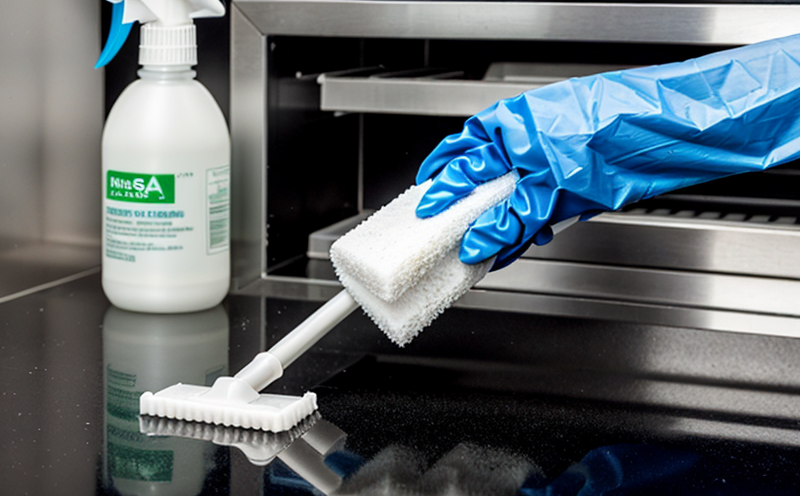ASTM G21 Fungal Resistance Testing of Cleaning Plastics
The ASTM G21 fungal resistance testing is a critical procedure used to evaluate the durability and longevity of materials exposed to fungi. This test is particularly important for cleaning plastics, which must maintain their integrity and functionality in harsh environments such as healthcare facilities, food processing plants, and laboratories. Fungi can pose significant challenges to material performance by causing degradation and reducing the effectiveness of surfaces intended to be hygienic.
The testing procedure follows a standardized approach that allows for consistent evaluation across different materials and manufacturers. The test involves exposing specimens made from the plastics in question to specific fungal species under controlled conditions, then assessing their resistance through weight loss analysis, surface appearance changes, or other relevant metrics. This helps ensure that cleaning products containing these plastics meet stringent hygiene standards.
Understanding the mechanisms behind fungal degradation is essential for designing effective solutions. Fungi produce enzymes capable of breaking down complex organic compounds, including those found in many synthetic polymers used in cleaning applications. By subjecting samples to controlled fungal exposure, researchers and manufacturers can identify vulnerabilities early on during product development stages.
The relevance of this testing extends beyond just ensuring basic functionality; it also plays a role in sustainability efforts by promoting the use of eco-friendly materials that are less susceptible to biological contamination over time. Additionally, compliance with industry standards such as ASTM G21 ensures confidence among customers who rely on these products for maintaining high levels of cleanliness and safety.
In summary, ASTM G21 fungal resistance testing provides valuable insights into how well cleaning plastics can withstand exposure to fungi without compromising their performance or integrity. This knowledge is crucial not only from a technical standpoint but also in terms of meeting regulatory requirements and building trust with end users.
Why It Matters
The importance of ASTM G21 fungal resistance testing cannot be overstated, especially when it comes to cleaning plastics. In environments where hygiene is paramount—such as hospitals, food processing plants, and laboratories—the presence of even small amounts of fungi can lead to significant issues.
- Health Risks: Fungal contamination on surfaces used for cleaning purposes could potentially spread harmful pathogens, leading to infections or other health hazards among staff and patients.
- Deterioration of Materials: Continuous exposure to fungi can cause physical deterioration of plastic components over time, reducing their lifespan and effectiveness. This is particularly concerning in disposable products meant for single use but used repeatedly due to insufficient durability.
- Increase in Cleaning Efforts: If cleaning plastics cannot resist fungal growth effectively, it may necessitate more frequent cleaning cycles or the introduction of additional disinfection protocols, increasing operational costs and resource consumption.
By conducting ASTM G21 tests, manufacturers can ensure that their products meet necessary standards for durability and hygiene. This not only enhances customer satisfaction but also contributes positively to public health by minimizing risks associated with contaminated cleaning tools or equipment.
Quality and Reliability Assurance
- Consistent Results: By adhering to ASTM G21 guidelines, laboratories provide consistent results that can be relied upon by clients. This consistency is vital for quality assurance programs aimed at maintaining high standards within the industry.
- Regulatory Compliance: Meeting regulatory requirements such as those set forth by ASTM ensures compliance with international standards and helps avoid potential legal issues related to non-conformance.
- Credibility: Clients place trust in laboratories that deliver reliable test outcomes. Providing accurate information about a product's resistance to fungi builds credibility among stakeholders, including suppliers, regulatory bodies, and end users.
The rigorous nature of ASTM G21 testing ensures that only materials capable of withstanding fungal exposure are approved for use in cleaning applications. This process helps maintain the integrity of products throughout their lifecycle, ensuring they continue to perform optimally even under challenging conditions.
Use Cases and Application Examples
- Healthcare Facilities: Hospitals frequently encounter issues related to fungal contamination on various surfaces. Using ASTM G21-compliant cleaning plastics helps minimize these risks, ensuring safer environments for patients and staff.
- Food Processing Plants: In industries where food safety is a priority, preventing fungal growth on tools and equipment used during production processes is crucial to maintaining quality control standards.
- Research Laboratories: Scientists conducting experiments involving biological samples require reliable cleaning materials that do not introduce contaminants into their work environments. ASTM G21 testing ensures they get products suited for this purpose.
Additionally, manufacturers of disposable items like gloves, masks, and other personal protective equipment benefit greatly from rigorous fungal resistance testing because it guarantees that these items remain effective throughout their intended usage period without succumbing to microbial damage prematurely. This contributes significantly towards enhancing overall safety measures across multiple sectors.





